This online event was part of the initiative “Mediterranean Diet’s Principles for Agenda 2030”, a series of thematic sessions promoted by the Food and Agriculture Organization and the Italian Permanent Representation to raise awareness on how the Mediterranean Diet can help achieve Sustainable Development Goals. A sustainable diet should guarantee food security, promote healthy lifestyles, avoid food loss and waste, contribute to reducing environmental impacts, and improve the well-being of current and future generations.
The approach of the Alliance for the Mediterranean Diet has potential common goals with those of the FAO- Globally Important Agricultural Heritage Systems Programme in achieving sustainable agriculture and food systems which reduce the impact on the environment, conserve biodiversity, landscapes, cultures and traditional knowledge.
IN THE SPEAKERS WORDS
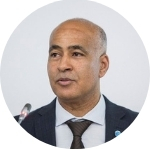
The opening remarks from the Deputy Director of the FAO´s Office of Climate Change, Biodiversity and Environment, Zitouni Ould Dada, started the meeting. In presenting the webinar’s aims, Mr Ould-Dada highlighted the resilient character and adaptation ability of traditional healthy diets as well as the link with their territories, as it is the Mediterranean Diet case.
In underlining the webinar’s role as part of the initiative “Mediterranean Diet’s principles for Agenda 2030”, he finally stressed the importance of identifying synergies and mutual benefits of traditional healthy diets and raising awareness on preserving agricultural heritage systems as keys for the post Covid-19 era.

The Italian Ambassador to FAO, Vincenza Lomonaco, underlined the GIAHS role to the conservation of traditional foods and healthy diets. In stressing the commitment of the Italy in accompanying the debate on food systems and agrobiodiversity, she also highlighted the wide roles of traditional diets in preventing diseases as well as strengthening world food security.
The Ambassador concluded welcoming Japan in the Alliance for the promotion of the principles of the Mediterranean Diet and other traditional diets.

Davide La Cecilia, Diplomatic Advisor to the Italian Minister of Health, underlined the growing importance of traditional diets in guaranteeing the health of populations. Traditional diets, La Cecilia also stated, contribute to the achievement of SDGs and the well-being of the World's ecosystems.
Finally, he anticipated the scientific results of the studies led on the Mediterranean Diet, as part of the UN Decade of Action on Nutrition, which demonstrated the Mediterranean Diet as a model for healthy and sustainable diets.
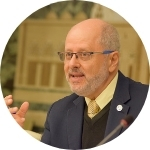
Eduardo Mansur, Director of the FAO’s Office of Climate Change, Biodiversity and Environment, concluded the opening session affirming the importance of GIAHS in promoting a sustainable agriculture and offering the knowledge base for innovations we need. He underlined the role of GIAHS as “living laboratories” that link healthy diets, nutrition, and a sustainable environment.
Mansur then stated that a healthy environment and healthy lives are essential to recover from the Covid-19 pandemic, and that the Mediterranean Diet and the other traditional diets offer the opportunity to overcome the current World issues.

Yoshihide Endo, Coordinator of the GIAHS Secretariat, introduced the concept of “Sustainable Healthy Diets”, and how the diets have an environmental impact. He emphasized that the purpose of this webinar is to learn how traditional and cultural diets such as the Mediterranean diets and diets from Japan and China can contribute to sustainable agriculture and a sustainable world.
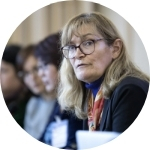
Florence Tartanac, Senior Officer of the FAO Nutrition and Food Systems Division, presented “Traditional food systems to support healthy and culture-based diets”, emphasizing the invaluable role that GIAHS and Geographical Indicators (GI) approaches can play for the preservation and promotion of traditional diets, such as the Mediterranean one, for the transformation of current food systems, and for the attainment of the objectives of the 2030 agenda. Indeed, both GIs and GIAHS highly value and support culture, local knowledge, biodiversity, agroecological practices, the territory, and its local actors.
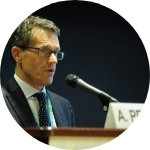
Andrea Pezzana is the Director of the Clinical Nutrition Unit at Azienda Sanitaria Città di Torino (Italy). In his presentation, whose title was “The Mediterranean Diet as a traditional, healthy, and sustainable model”, he pointed out that environmental degradation and biodiversity loss, two phenomena largely induced by modern food production systems and radical changes in dietary patterns, are exacerbating malnutrition and micronutrients deficiencies issues and further endangering the health of human-beings, animals, and ecosystems. By contrast, he stressed the four benefits generated by a sustainable diet such as the Mediterranean one, namely healthier ecosystems, more resilient economies, increased protection of human health, and respect of local cultures.
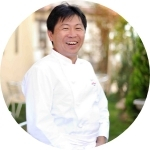
Masayuki Okuda, a chef from Japan, presented on “Preservation of agricultural genetic species through dishes featuring heirloom plant species”. He introduced his activities on preserving the genetic resources of heirloom species in Tsuruoka city, Shonai Area of Yamagata Prefecture, and how restaurants can contribute to preserving multiple heirloom species by introducing them in plates served in restaurants. He also explained the importance of a triangular relationship between farmers, researchers and restaurants, in order to create a social movement to secure the preservation of the species.

Matteo Vittuari is associate professor at the department of Agro-Food Sciences and Technologies of the University of Bologna. In his presentation, whose title was “Assessing economic, environmental, and social sustainability in local food systems”, Vittuari defined what is a City Region Food System (CRFS) approach and laid out its main features. In addition, he emphasized the importance of designing operational methodologies and assessment tools that can help us to more accurately evaluate the environmental, social, and economic sustainability of local food systems and that can be used by a vast array of non-expert stakeholders.

Chiara Mattiello and Andrea Gaudenzi, representatives of the Italian GIAHS (Traditional Soave vineyards and Olives groves of the slopes between Assisi and Spoleto) underlined the importance of the main local traditional products, olives oil and wine, in guaranteeing human health within the Mediterranean Diet.
They underlined the organoleptic value of the two products, demonstrated by various scientific studies, in improving the health conditions and lives of those who take them regularly.

José María García Álvarez Coque, professor at University of València (Spain), described the GIAHS of the historical waterscape of Horta de València, highlighting its resilient character and the role of the local food system to Mediterranean Diet.
In his presentation, he described all the benefits of the Valencian GIAHS to the Mediterranean Diet, starting from the preservation of agrobiodiversity, local gastronomy and in improving livelihood. In particular, he stated the link between the Horta and the city of Valencia in promoting the consumption by the urban population of healthy local products.

Hatem Zitouni, president of ASM Gafsa (Tunisia), introduced “Resilience, Climate Change Adaptation and Local diets in Gafsa Historical Oasis in Tunisia”. He presented the food habits of the oasis of Gafsa mainly based on vegetables and pointed out that the local diet is based on a combination of locally produced and non-locally produced ingredients. He introduced the adaptation measures that have been adopted by local farmers, such as locally developed corn seed varieties, increase of proportions of plant-based foods, manure management and adaptive culture.

Susan Luzio is part of ADRAT (Association of Regional Development of Alto Tâmega's Region) and acted as the representative of the Barroso GIAHS site in Portugal. She has introduced and thoroughly described the main characteristics of the agro-livestock farming system present in Barroso. In particular, she underlined that communitarianism is the quintessential element that allowed small holdings to develop a strong sense of solidarity and cooperation and to deal effectively with common issues over time. Finally, she highlighted that several products associated with the Mediterranean diet are produced in the Barroso territory, such as olive oil, PDO certified honey, and aromatic herbs, and that the local cuisine relies significantly on them.

Xiande Li, a Professor in Chinese Academy of Agricultural Sciences (CAAS) and a member of the High Level Panel of Experts of the UN-CFS, presented “The GIAHS traditional wisdoms to promote healthy diets in China”. He explained about global challenges in food and agricultural systems, and how traditional wisdoms of Chinese GIAHS can resolve the challenges and contribute to 4 betters - better production through diversified ecosystems and germplasm resources based on traditional knowledge / techniques, better nutrition through healthy diets and high quality agricultural products produced from GIAHS, better environment through sustainable environmental management / maintenance and better life through beautiful landscapes, rich culture and employment creation.
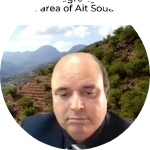
Mohammed Bachri, Director of strategy and partnerships of the national Agency for the Development of Oasis Zones and Argan in Morocco (ANDZOA), presented “GIAHS-Morocco: International visibility and opportunities for a sustainable development”, and introduced the agricultural production systems in GIAHS in Morocco, characterized by ancestral and rustic agricultural system which produces rich and healthy food. He emphasized the culinary and health benefits of argan oil, which has reached international markets. The argan tree is adaptable to the difficult climate and environment, and original cultural and economic systems, traditional practices (such as water resource management systems) and lifestyles have rooted around the argan forest. The agricultural systems fit with sustainable development policies and preserves biodiversity and agricultural diversity.

Since 2008, Roberto Capone has been working as Principal Administrator at the International Center de Hautes études Agronomiques Méditerranéennes (CIHEAM) in Bari. During his presentation, whose title was “Sustainability of Mediterranean Food systems”, he drew attention to the fact that the Mediterranean Diet is not just healthy but also sustainable as it reduces the overall impact of our food system on the environment and fosters pivotal social and cultural elements associated with it. Indeed, such a diet contributes to preventing chronic diseases, to protecting biodiversity, and to championing social and cultural values related to food production and consumption. In conclusion, he pointed out that the GIAHS Program can play a crucial role in raising awareness about key aspects of the Mediterranean diet and in safeguarding it through the development of innovative solutions and the conservation of traditional knowledge.

Katsuyoshi Ishii, Director-general of Agriculture, Forestry and Fisheries Department, Ishikawa Prefecture, Japan, gave his presentation “Toward the Realization of Sustainable Agriculture and Rural areas in GIAHS ”Noto’s Satoyama and Satoumi”. He introduced how the GIAHS site “Noto’s Satoyama and Satoumi” is deeply related with traditional diets. There are many food producing / processing techniques, and traditional festivals / rituals closely related to agriculture, which activities contribute to preserving biodiversity and landscapes. He emphasized the Prefecture’s efforts to preserve the site through funds aimed to support farmers and activities such as food branding and tourism.
MODERATOR

Since 2015, Nazarena Lanza coordinator of Slow Food activities regarding products value chains and producers’ communities in near Eastern and Northern Africa.
She pointed out that the Mediterranean Diet, together with our traditional cuisine, has contributed to forging a strong cultural, historical, and spiritual union between Mediterranean civilizations. Furthermore, she stressed the synergies between the work and the objectives of Slow Food and those of the GIAHS Program as they both aim at preserving agricultural traditions, maintaining agricultural heritage alive, and promoting sustainable production techniques to ensure quality products to consumers and to advance landscape conservation.

